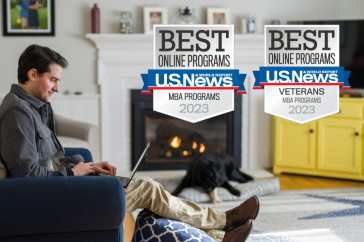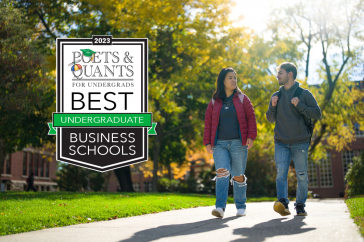
Sustainability matters to Abby Lamothe. During her sophomore year, the business administration/accounting major took the courses Food and Society and Food and Class as electives. She began looking at food “through a different lens,” she says, and became especially interested in the acceptance and use of food stamps at farmers markets. By the time she started her junior year, Lamothe had become active in the local food movement and a fixture at the North Berwick farmers market just over the border in Maine, where she volunteered.
One day during Advanced Managerial Accounting class in the fall semester of her senior year, professor John Hasseldine was explaining different accounting theories using an example Lamothe could relate to — a dairy farmer.
Sage Advice
 We asked Abby Lamothe what advice she would give an incoming freshman on how to make the most of his or her UNH experience. Here’s what she said:
We asked Abby Lamothe what advice she would give an incoming freshman on how to make the most of his or her UNH experience. Here’s what she said:
Push your boundaries. Take a class that you don’t really know if you’ll enjoy. You might fall in love with it; you might realize it’s not for you. Never in a million years did I think a food class would have sparked my interest in agriculture, but it did. Really explore the time and room schedule; pick through it. Give yourself an hour or two. You never know what might spark your interest, and something really cool could happen. I never thought I’d spend three years running the food stamp booth at a farmers market, but because of that one class at UNH, I did. You have to let yourself be vulnerable and scared and push through it, because something really beautiful can happen. When you push your boundaries you learn a lot about yourself that’s unexpected.
It was an “ah ha” moment for the Dover native, whose honors thesis deadline loomed. “I had been thinking about my thesis, but nothing had jazzed me up to that point,” says Lamothe. “But here was a chance to meld my food interests perfectly into my accounting interests.” After the lecture she approached Hasseldine, and her thesis project was born: Farm Business Management: A Localized Analysis of Financial Tools Utilized in Agribusiness.
She set out to learn more about the accounting systems used in agribusiness. To start, she conducted 21 meetings with seven area farms, gathering information about farm sizes, product lines, pricing and accounting structures, and witnessing the operations during on-site visits. She expected to find that regardless of what types of products farms were producing, the underlying accounting systems would be the same, but instead she found that every business had a different cost structure and calculated differently. “I realized that pursuing this further would result in a 5,000-page thesis, which wasn’t feasible,”?Lamothe says.
She talked with Hasseldine, then zeroed in on three farms that had an overlapping product — broiler chickens — to look for similarities and differences in their accounting systems. Lamothe examined a dozen aspects of their operations to “figure out the nooks and crannies.” She looked at the amount of square footage the broilers had, slaughter cycles and feeds, for example. “Since my focus was on the cost accounting side of things, these are really important factors that farmers need to know and understand. If the broilers are raised for six weeks, how much does that cost in terms of labor and feed? Would a 12-week cycle produce better meat and therefore greater value, and would it be cost-effective?” These are the kinds of variables farmers take into consideration, says Lamothe, because all affect their bottom line.
Abby’s Path to Employment
Abby Lamothe '14 '15G will begin work as a staff auditor this fall with regional accounting firm Baker Newman Noyes. Lamothe first met the company at the UNH accounting career fair. She went prepared.
“I went to paulcareers.edu and did research on who would be at the job fair,” she says. “Then I worked on my résumé, got my elevator speech ready, got my suit ready. At the fair I talked to a dozen accounting firms, took notes, got business cards, wrote follow-up e-mails and sent my résumé. I applied to a bunch of jobs and got first and second-round interviews for many. I got lots of rejection letters, too. Then I sat and crossed my fingers and hoped I’d get a job offer.”
She did. And it happened to be from the first company she interviewed with.
“From the first interview with Baker Newman Noyes, they made me feel at home,” Lamothe says. “Their ears were listening. Their faces were listening.” At the end of her second interview, she left with a goody bag whose contents were right up her alley — a sustainable beverage tote, maple syrup and other locally produced goods.
“It said a lot about their mission and the type of people who work there, the values of the firm. That really spoke to me.”
Once she got the analytics going, Lamothe began to see similarities and patterns. “I was able to make comparisons — among the three farms, themselves, and to industry standards.
“They trusted me with their secret financial data,” Lamothe says. “It was really rewarding.”
During weekly meetings, Lamothe and Hasseldine caught up on her progress.
“Abby was simply the most prepared student at UNH I have had the pleasure to supervise,” says Hasseldine. “She would make our meeting schedule, produce an agenda, bring a print out of documentation and reference material and be ready to discuss the next steps. Every week, I’d get a narrative and her enthusiastic update.”
In the end, Lamothe shared her results with the three farms. “I wanted to bring it full circle,” she says. “I got great information; I wanted them to get great information, too.” She has kept in touch with the businesses.
Hasseldine says that while many accounting projects deal with big-picture aspects of the accounting environment, such as technical rules for auditing companies and intricate details of tax laws, “Abby’s project was simply different in a very refreshing way. She identified the research problem herself and adapted the textbook approach of Managerial Accounting to study real-life issues and decisions that farmers need to consider. Essentially, she was studying sustainability from an accounting viewpoint on a local perspective.”?
Lamothe says it was “nice to bring a fresh new topic to the accounting department,” and it helped fuel her passion about the topic. Today, having graduated in May from the one-year master's of science in accounting program at the Peter T. Paul College of Business and Economics, she is studying for the CPA exam. In the fall, she’ll begin working as a staff auditor for Baker Newman Noyes at the firm’s Manchester, New Hampshire, office.
?
Photography by Scott Lamothe
?
-
Written By:
Tracey Bentley | Communications and Public Affairs




















































